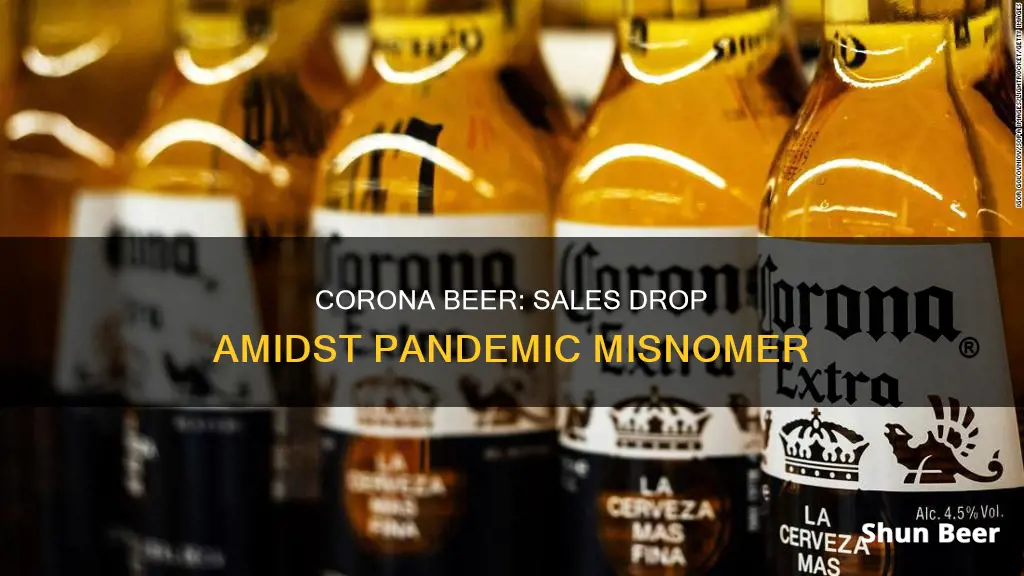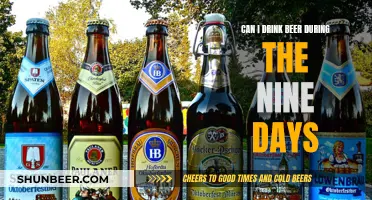
In early 2020, during the COVID-19 pandemic, a survey by 5W Public Relations found that 38% of Americans would not buy Corona beer under any circumstances due to its similarity in name to the coronavirus. However, the survey question did not mention COVID-19, so it may simply have indicated a preference for a different brand. Sales of Corona beer increased 8.9% in the first three months of 2020, and the brand saw year-over-year growth of 24% in the first three weeks of March 2020, as American consumers were drinking more beer and alcoholic beverages while staying at home during the pandemic.
| Characteristics | Values |
|---|---|
| People's perception of Corona beer | Some people associate Corona beer with coronavirus. |
| Beer sales | Sales increased by 8.9% in the first three months of 2020. |
| Survey results | 38% of beer-drinking Americans say they will not order Corona. |
| Beer drinkers' concerns | 16% of beer drinkers surveyed were confused about whether Corona beer is related to coronavirus. |
| Beer popularity | Corona is the third-most popular imported beer in the U.S. |
| Beer consumption | People are drinking more beer and alcoholic beverages while staying at home during the pandemic. |
What You'll Learn
- People may be drinking less Corona beer because of its name similarity to coronavirus
- The beer's reputation may have been damaged by a Heineken-started rumour that it contained urine
- People may be drinking less Corona because of its association with the 'Fast & Furious' franchise
- The beer is served with a lime wedge, which may put people off
- People may be drinking less Corona because of its clear glass bottles, which can make the beer turn sour

People may be drinking less Corona beer because of its name similarity to coronavirus
The situation has resulted in a unique challenge for the Corona brand, with social media attention and internet searches linking the beer to the virus. This negative association has likely influenced some drinkers to avoid the brand, at least in public settings. A survey conducted by 5W Public Relations found that 38% of American beer drinkers said they wouldn't buy Corona at the time, and 14% of regular Corona drinkers admitted they wouldn't order it in public. These figures suggest a significant number of consumers were hesitant to be associated with the brand during the pandemic.
The impact of the coronavirus on Corona beer is also reflected in brand perception metrics. Corona's "buzz score," an indicator of consumer sentiment, declined sharply in the early months of 2020. This decline suggests that the brand's reputation was affected by the pandemic, potentially leading to reduced sales and market share. However, it's important to note that actual sales data may paint a different picture, as sales of alcoholic beverages, including Corona, increased during the same period due to higher at-home consumption.
While the name similarity between Corona beer and the coronavirus may have caused some consumers to hesitate, it's worth noting that the brand has a strong and established reputation. Corona is the top-selling imported beer brand in the United States and has been a popular choice for decades. The brand's parent company, Constellation Brands, has also stated that they are not overly concerned about the association, believing that consumers understand the distinction between the virus and the beer.
In conclusion, while the name similarity between Corona beer and the coronavirus may have contributed to a perceived decline in consumption, the actual impact is complex and influenced by various factors. The power of the Corona brand, combined with changing consumer behaviours during the pandemic, resulted in a unique challenge for the company's reputation and marketing strategies.
Painkillers and Beer: Safe Mix or Dangerous Cocktail?
You may want to see also

The beer's reputation may have been damaged by a Heineken-started rumour that it contained urine
In the late 1980s, Corona Extra was a popular beer in the United States, having only arrived in the country in 1979. However, its success was suddenly threatened by a damaging rumour that the beer contained urine. This rumour was started by rival beer distributors, who alleged that Mexican workers were using beer containers destined for the US as urinals.
The rumour was particularly effective because of the colour of the beer, which was a deep-gold or yellow, and its foaminess, which made it look similar to urine. The fact that Corona was sold in clear glass bottles, showcasing its colour, only made this association more obvious.
The rumour was traced back to Heineken distributor Luce & Son, Inc. (or Luce & Sons), who were presumably trying to chip away at Corona's growing market share. Luce & Son agreed to issue public statements denying the allegations and settled out of court when sued by Corona's US handlers, Barton Beers Ltd.
The rumour also fed upon and amplified racist stereotypes against Hispanic culture. It took Corona years to recover, and it has taken even longer to dispel the falsehood. Even today, some people still refer to Corona as "Mexican piss water".
Beer and Alpha-Gal: What You Need to Know
You may want to see also

People may be drinking less Corona because of its association with the 'Fast & Furious' franchise
The Corona beer brand has been heavily associated with the Fast & Furious franchise, with the beer appearing in most of the franchise's films. In the first film, Vin Diesel's character, Dominic "Dom" Toretto, says: "You can have any brew you want... as long as it's a Corona."
Corona's association with the Fast & Furious franchise is not a paid product placement. Instead, it is meant to symbolise home and family, with Corona being a popular beer in Southern California, where the first film is set.
However, Corona's appearance in the Fast & Furious films may have contributed to a decline in sales. In 2020, 38% of American beer drinkers surveyed said they wouldn't buy Corona "under any circumstances" at that time. This may be because Corona shares its name with the coronavirus, which was spreading in the US at the time of the survey.
Therefore, it is possible that people are drinking less Corona because of its association with the Fast & Furious franchise, as the beer's appearance in the films may have contributed to its negative association with the coronavirus.
Drinking Beer in Public: What's the Legal Limit?
You may want to see also

The beer is served with a lime wedge, which may put people off
The Mexican lager Corona is often served with a lime wedge, a combination that has become so iconic that it is now hard to imagine drinking the beer without it. However, some people may find the addition of lime off-putting. While the exact origin of this pairing remains a mystery, there are several theories as to how it came about.
One theory suggests that the lime was originally added to remove rust and sterilise the bottle caps, which were known for leaving rust marks on the rim. Another similar claim is that the citrus fruit was used as a disinfectant, especially as the drinking water in Mexico is known to have deleterious effects on health. However, these theories are at odds with the fact that Corona has been brewed for over a century, and locals did not add lime until recent times.
Another possible explanation is that the lime helps to mask the skunky flavour and aroma that can develop in Corona's clear bottles due to exposure to light, which causes the bitter alpha acids in the beer to transform into the same chemical found in a skunk's spray. Additionally, it has been suggested that the lime acts as a natural bug repellent to keep flies out of the beer.
The most likely scenario, however, may be that a bartender started the trend in 1981 to increase the marketability of the Mexican lager. Whatever the reason, the brand has since embraced the combination, featuring citrus in practically every advertisement. In 2017, Corona even launched its "Horns Up, Limes In!" campaign as part of its sponsorship of the University of Texas Longhorns.
While the addition of lime to Corona has become a popular and enduring tradition, it is possible that some drinkers may not appreciate this flavour combination, preferring to savour the original taste of the beer without any enhancements.
Mixing Beer and Red Wine: A Good Idea?
You may want to see also

People may be drinking less Corona because of its clear glass bottles, which can make the beer turn sour
It is possible that people are drinking less Corona beer because of its clear glass bottles, which can cause the beer to turn sour. Corona is a Mexican-born lager that began domestic distribution in 1925 and entered the US market in 1981. Since then, it has become the number one beer import in America. Corona is also the third most popular imported beer in the US, with Guinness and Heineken taking the top spots.
Corona is known for its clear glass bottles, which are intentional and meant to showcase the beer's sunny yellow colour. However, this packaging decision may have unintended consequences. Clear glass bottles are the quickest way to "skunk" a beer, or oxidise it, as light causes beer to lose hop flavour and produce off-flavours. This is ironic, as Corona is named after the sun's corona.
The use of clear glass bottles in beer packaging is a controversial topic. Some craft breweries prefer clear bottles because they let more light pass through, enhancing the flavours and aromas of the beer. Clear bottles also make it easier to see the hue of the beer, allowing beer aficionados to assess its quality. Additionally, clear bottles can help ensure proper ageing and protect the beer from outside contaminants, such as oxygen, which can adversely affect its taste.
However, others argue that clear bottles can cause beer to become skunked or stale due to light exposure. This is especially true for lighter beers like lagers and pale ales. In fact, Corona contains GMO corn syrup and propylene glycol, a food additive that can pose health risks when consumed in large quantities. It also has a relatively high calorie count, with 148 calories and 14 grams of carbs per bottle.
While the clear glass bottles may not be the sole reason for a decrease in sales, it is possible that they contribute to consumers' perceptions of the beer's quality and freshness.
Heart Surgery and Beer: What's Safe to Drink?
You may want to see also
Frequently asked questions
Some people are drinking less Corona beer because of its name similarity to coronavirus. According to a survey, 38% of beer-drinking Americans said they wouldn't order a Corona.
No, Corona beer is not related to the coronavirus. The alcoholic beverage has absolutely no connection to the virus.
A measure of how likely consumers are to buy the beer has fallen to a two-year low. Corona's "buzz score" has skidded to 51 from 75 at the start of the year.
Yes, despite the negative association with the coronavirus, Corona is still the top-selling brand of imported beer in the United States. It is the fifth most popular beer overall in the country.







